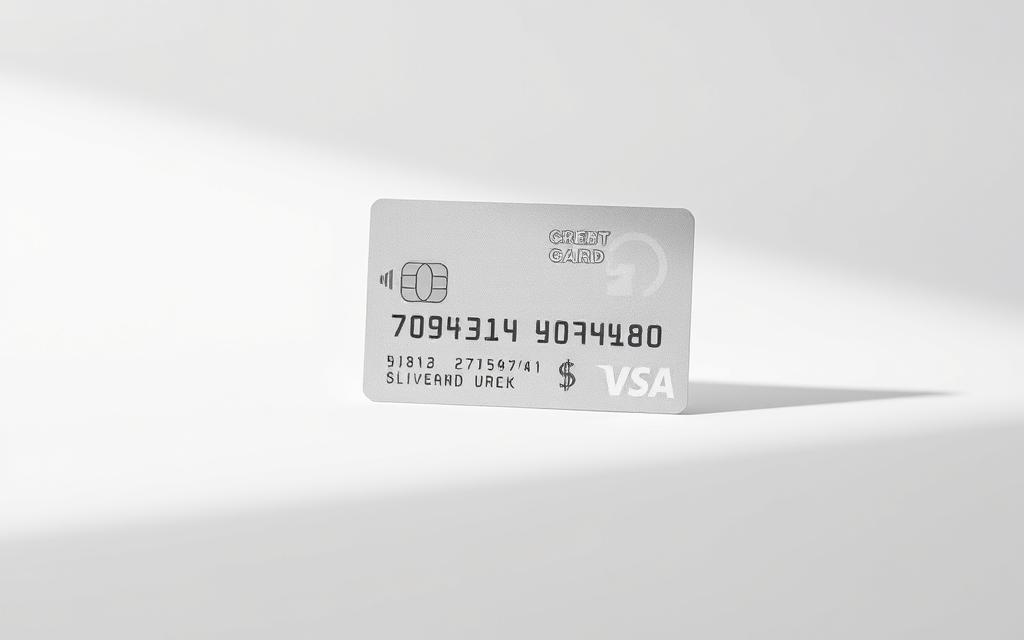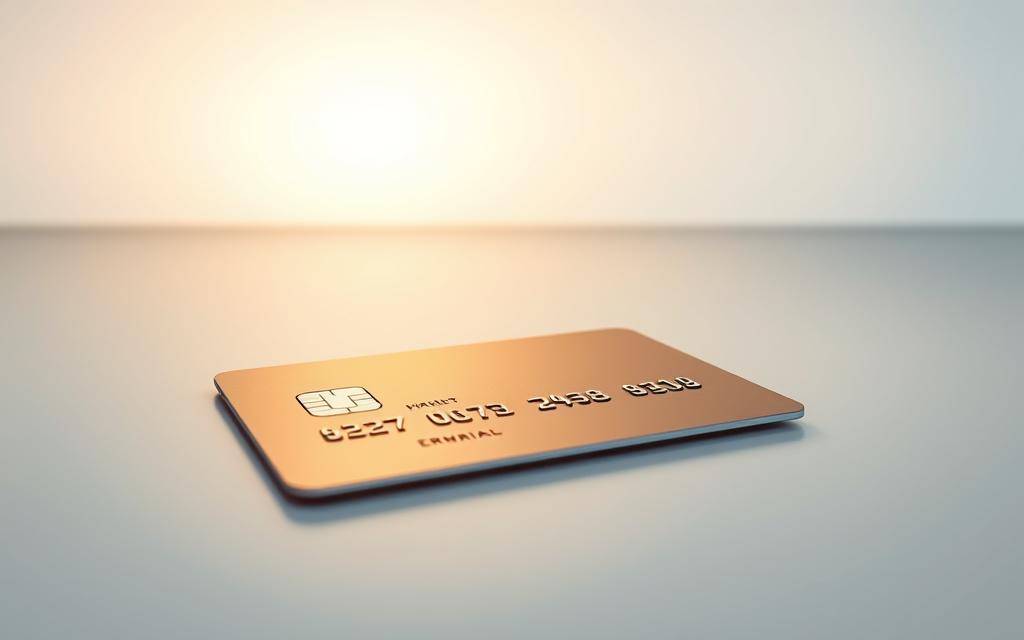Did you know about 70% of Americans have a credit card? This shows how crucial it is to use these financial tools well. With smart use, credit cards bring convenience and rewards. However, they can be tricky if not handled correctly. Knowing the right tips can improve your finances while avoiding problems.
This guide aims to teach you the top credit card tricks for getting the most rewards, controlling your spending, and boosting your credit score. It doesn’t matter if you’re experienced or new to credit cards. These tips will help you use them wisely in the complex credit world.
Understanding Credit Card Basics
Credit cards are tools that let you borrow money up to a set limit for buying things. They offer benefits like fraud protection and rewards. But, it’s important to know how they work to avoid problems and keep your finances in check.
What is a Credit Card?
A credit card is given by banks or lenders. It lets you use a line of credit instead of cash. You must pay back on time to avoid interest on what you owe. Knowing this helps manage the responsibility of borrowing and repaying.
How Does Interest Work?
Interest is the cost of borrowing money on a credit card. Not paying the full balance by the due date means interest will be charged on what’s left. This can make debt grow. Paying the full balance regularly helps avoid extra interest and keeps finances healthy.
Credit Limit and Utilization Explained
Your credit card has a max amount you can borrow, called a credit limit. Credit utilization is how much of this limit you’re using. Keeping this under 30% helps your credit score stay high. Using too much can look bad to lenders, affecting your ability to borrow in the future. Knowing this can help improve your credit standing.
Choosing the Right Credit Card
Finding the best credit card can feel like a huge task. It’s because there are so many out there. It’s important to know the types of credit cards to match one with your spending habits and goals. Each kind of card has its purpose. Figuring out what you need helps you choose the right card.
Types of Credit Cards Available
There are a few key types of credit cards:
- Cash-Back Cards: These cards give you a part of your money back on what you buy. They are great for people who shop a lot.
- Travel Rewards Cards: For travelers, these cards earn points or miles on spending. You can use them for flights, hotels, and more.
- Low-Interest Cards: Best for those who sometimes carry a balance. They have lower interest rates, making borrowing cheaper.
Factors to Consider When Choosing
Think about these things when choosing a credit card:
- Interest Rates: Look at the APR to know the borrowing costs.
- Fees: Check for annual fees, late fees, and other charges.
- Rewards Programs: See if the rewards fit your spending habits.
Rewards Programs Explained
Credit cards often have rewards programs to keep customers happy. These include:
| Card Type | Rewards Structure | Benefits |
|---|---|---|
| Cash-Back Card | 1.5% – 5% cash back on every purchase | Save money on everyday items |
| Travel Rewards Card | 1-3 points per dollar spent | Use points for travel needs |
| Low-Interest Card | Minimal rewards; focus on low APR | Ideal for occasional balance carriers |
Building Your Credit Score with Credit Cards
Having a strong credit score is very important. It helps you get good deals on loans, insurance, and housing. The main things affecting your score are how well you pay your bills and how much you use your credit cards. Using credit cards smartly is a big part of boosting your credit score.
Importance of a Good Credit Score
A good credit score helps a lot financially. It means you’re seen as less risky to lenders. You get lower rates and better terms on money you borrow. Companies trust you more when your credit score is solid.
Tips for Maintaining a Healthy Score
- Make payments on time to help build a positive payment history.
- Keep credit card balances low relative to credit limits to maintain low utilization rates.
- Avoid opening too many new credit accounts in a short time; this can impact your overall score.
- Consider retaining older accounts, as they can positively affect your credit history.
By following these tips, you can keep your credit score high. This underlines the guidelines for a good credit score.
Maximizing Rewards and Benefits
Credit cards offer a great way for smart shoppers to get rewards. It’s key to know the difference between cash back and points. Each type suits different shopping styles and needs. By matching your reward type to how you shop, you can get the most out of credit card rewards.
Understanding Cash Back vs. Points
Cash back and points are popular rewards with credit cards. Cash back gives you a percent of what you spend back. Points, however, are earned with each dollar and can be used for travel, goods, or gift cards. Knowing which type suits your spending best can boost your rewards.
Utilizing Bonus Offers and Promotions
Watch for bonus offers to up your rewards game. Credit cards often have special times when you can earn more on certain buys. Paying attention to these offers can increase your rewards with no extra spend. Use these specials with your regular buys for extra benefit.
Paying Attention to Purchase Categories
Special rewards for categories like dining, groceries, or gas can be a big win. Knowing these categories helps plan your spending. Shopping in these bonus areas can hike up your earnings. It’s a smart way to maximize your credit card rewards.
Responsible Credit Card Management
Managing credit cards well is key to staying financially fit. Setting rules for using them can guide expenses. It helps balance sensible credit use with personal goals, making money matters stable.
Setting a Budget
At the top of good credit card habits is making a budget. It lets you keep track of spending and reduces overspending. Think about your income, must-pay bills, and extra spending. Set aside a part of your budget for credit cards to dodge unwanted debt.
Regularly Reviewing Statements
Checking your credit card statements often is important. It helps you watch spending and spot fraud early. Staying alert lets you take quick action, keeping your finances safe.
Emergency Fund Considerations
Having money saved for surprises is crucial. It means you use your credit card for buying things, not for emergencies. These steps improve your financial health and lead to smarter credit card use.

Avoiding Common Credit Card Pitfalls
Credit cards are handy and offer great rewards. But they can also cause financial issues if you’re not careful. It’s key to understand how to avoid deep debt, unseen fees, and impulse buys. Learning about these can help you use credit cards more wisely and get the most out of them.
High-Interest Debt and How to Avoid It
It’s easy for high-interest debt to grow if you don’t pay off your balance. To steer clear of this problem, try these methods:
- Pay your balance in full each month to avoid interest.
- Look for a credit card with a lower interest rate.
- Use balance transfer offers to move debt to cards with special rates.
Fees to Watch Out For
Knowing about different credit card fees can help you save money. Here are some important fees to keep an eye on:
| Fee Type | How to Avoid |
|---|---|
| Annual Fee | Choose cards with no annual fee or use rewards to outweigh the cost. |
| Late Payment Fee | Set up reminders or automatic payments to always pay on time. |
| Foreign Transaction Fee | Pick cards that don’t charge these fees for use abroad. |
Managing Impulse Purchases
Buying things on impulse can lead to spending too much and piling up debt. To keep your spending in check, try the following:
- Make a budget that sets limits for extra spending.
- Wait a bit before buying something expensive.
- Check your credit card statements often to cut back on needless spending.
Using Credit Cards for Travel
Travel credit cards offer great perks for those who love to travel. These cards let you earn points for flights, hotels, and more. Knowing how to use these benefits can really improve your travel.
Travel Rewards Credit Cards
Travel rewards credit cards are great for big spenders on travel. They offer nice sign-up bonuses to get points or miles fast. Some top picks include:
- Chase Sapphire Preferred
- Capital One Venture Rewards
- American Express Gold Card
These cards don’t just give you rewards. They also offer extra benefits like airport lounge access and no fees on international transactions. Plus, they often come with free travel insurance.
Tips for Foreign Transactions
When going overseas, it’s important to know about foreign transaction fees. Avoid surprise costs by using cards that don’t charge these fees. Make sure to tell your credit card company about your travel plans. This will help keep your card from being blocked.
Insurance Benefits and Protections
Many travel credit cards provide important travel insurance. They cover things like trip cancellations and lost luggage. Knowing what your card covers can ease your mind while you travel. Be sure to understand what the insurance covers and what it doesn’t.
The Importance of Timely Payments
Paying on time is key to managing your money well. It keeps your credit score safe and avoids extra costs. Knowing why it’s important can secure a better money future.
Consequences of Late Payments
Not paying on time can lead to problems. You might face:
- Increased interest rates: Miss a payment, and you might get stuck with higher rates.
- Late fees: These extra charges can pile up, making debt worse.
- Damage to credit scores: Since payment history is crucial for your score, being late can hurt for a long time.
Setting Up Automated Payments
Automating your payments is a great fix. It makes paying bills easier and does:
- Reduce stress: Forget about missing due dates ever again.
- Enhance reliability: Payments go through consistently without much work from you.
- Maintain a healthy credit score: On-time payments boost your credit history.
Payment Strategies for Different Situations
Depending on your money situation, different plans may work best. Think about these options:
- When money’s tight, pay the minimum to avoid late fees. When you can, pay more.
- If unexpected costs come up, still try to cover your credit card bills to protect your score.
- Think about using rewards, like cash back, to lower your balance if you can.
Understanding Fees and Interest Rates
Credit card fees are key to managing money well. Users should know about many fees, like annual ones. Though these fees might seem high, they often come with perks. By comparing these benefits to how you spend, you can see if a card is right for you.
Annual Fees and Their Justifications
Credit cards often charge yearly fees, from small to big amounts. These fees link to perks like rewards or travel credits. It’s smart to check if the perks are worth the fee. Cards with travel benefits are good for those who fly often. But those who spend less may prefer cards without annual fees.
How to Avoid Hidden Fees
Hidden fees can surprise you. They include charges for foreign transactions or going over your credit limit. Knowing these fees is key to avoiding shocks. Always read your credit card’s terms to avoid traps. For trips abroad, using cards without foreign transaction fees can save money.
Interest Rates Explained
Interest rates for credit cards change based on the bank and your credit score. Knowing how rates work helps with payments. Usually, interest applies to balances not paid by the due date. Understanding the annual percentage rate (APR) is essential. Paying the full balance each month avoids extra charges.
Monitoring Your Credit Card Activity
It’s crucial to keep an eye on your finances. This includes checking your credit card activity regularly. Doing so helps prevent overspending and fights against fraud. There are many ways to track your spending and stay financially healthy.
Using Apps for Tracking Spending
Some apps give updates on your spending as they happen. This keeps you aware of how much money you’re using. With tools like Mint, YNAB (You Need A Budget), and Personal Capital, tracking is a breeze. They organize your spending, showing where your money goes each month.
Keeping an Eye on Fraudulent Transactions
Always check your credit card statements for suspicious charges. Your banking app’s alerts can quickly notify you of any strange activity. If something looks wrong, report it fast to stop further issues.
Periodic Credit Report Checks
Looking at your credit report a few times a year is smart. It helps make sure your credit history is right. Keeping up with your credit report and card activity is key for good financial health.
| Resource | Feature | Best For |
|---|---|---|
| Mint | Budgeting, expense tracking | Overall financial management |
| YNAB | Goal-based budgeting | Budgeting enthusiasts |
| Personal Capital | Investment tracking | Wealth management |
Crafting a Credit Card Use Strategy
Creating a personal credit card strategy is key for managing your money well. It lets you fit credit card use into your budget wisely. This way, you get more out of your spending and save better. Credit cards become helpful tools instead of money troubles.
Aligning Credit Card Use with Financial Goals
Making a credit card plan should match your money goals. You might be saving for a house, setting aside emergency money, or looking for rewards. Using cards wisely for certain rewards, like travel or cash back on food, helps reach your goals. This makes your card spending and savings goals work together.
The Role of Credit Cards in Budgeting
Credit cards are big in planning your budget. Set clear spending limits and use cards for planned buys. This control helps manage your money better. It also makes keeping track of spending simpler. Plus, using budget tools with your credit cards keeps you on top of spending.
Periodic Reviews of Your Strategy
Checking your credit card plan regularly is important. Life changes like a new job or unexpected bills might mean changing how you use cards. These reviews help fine-tune your plan. They ensure your card use and budgeting keep your finances healthy.




